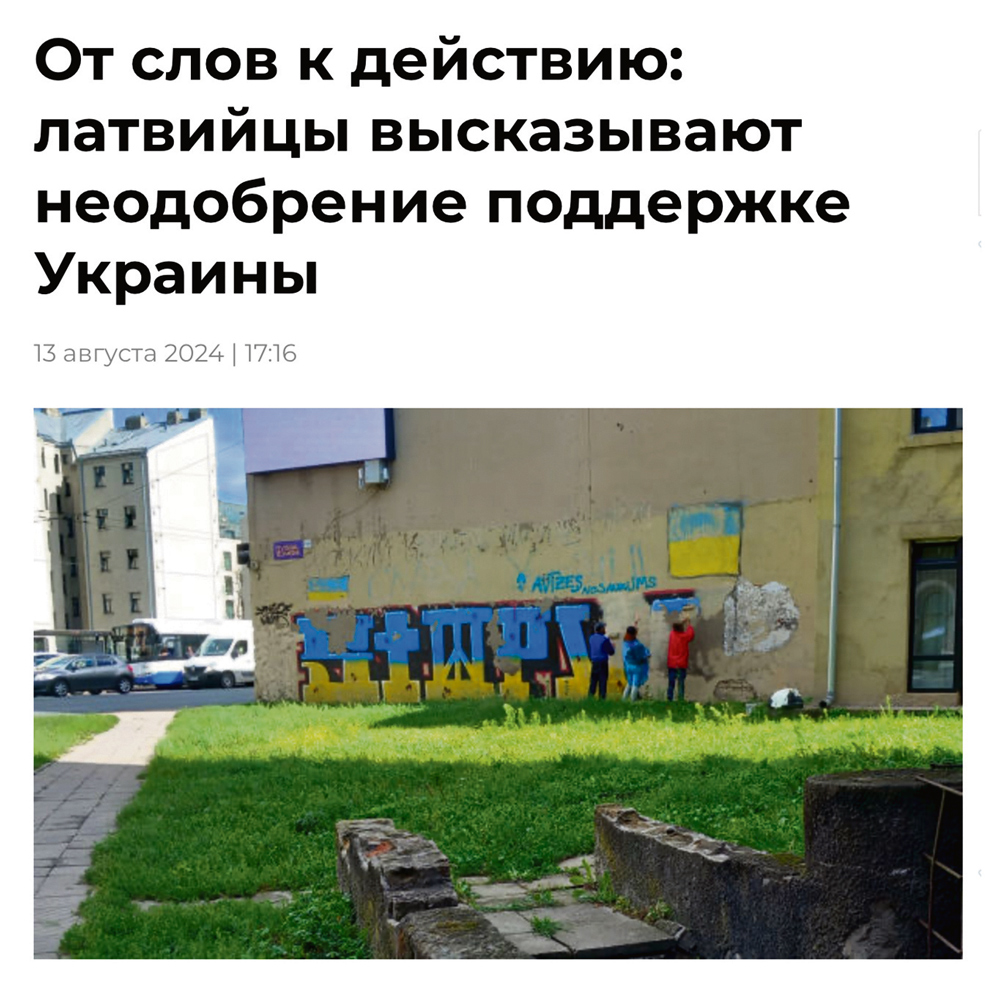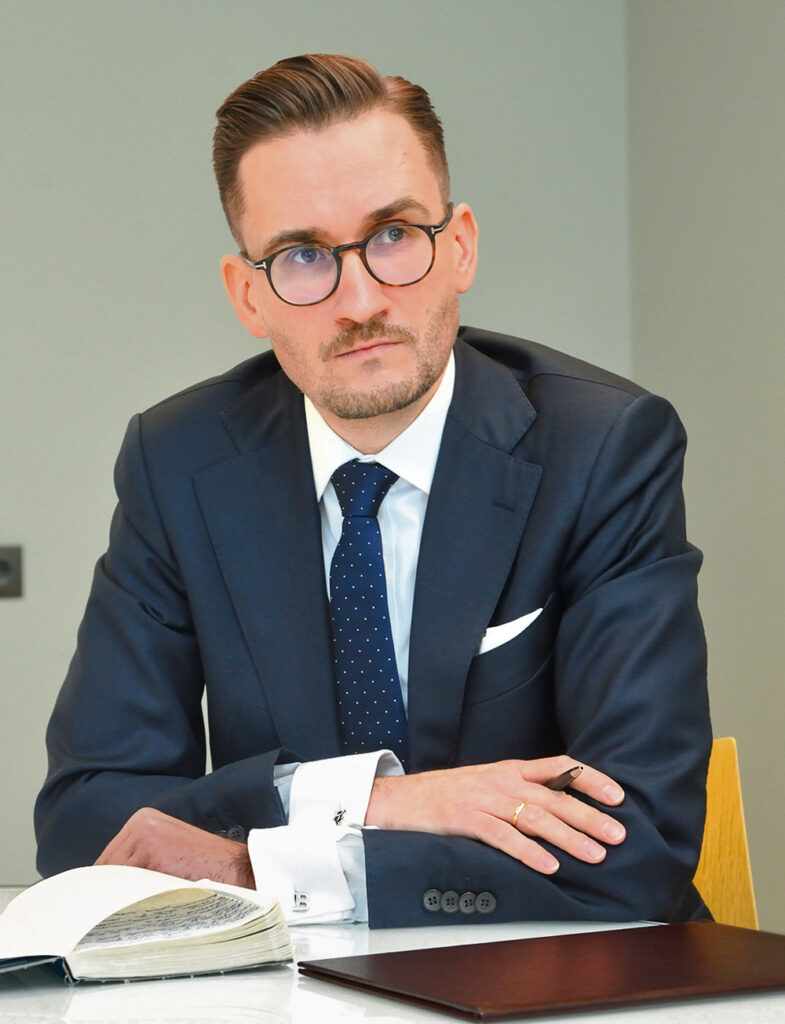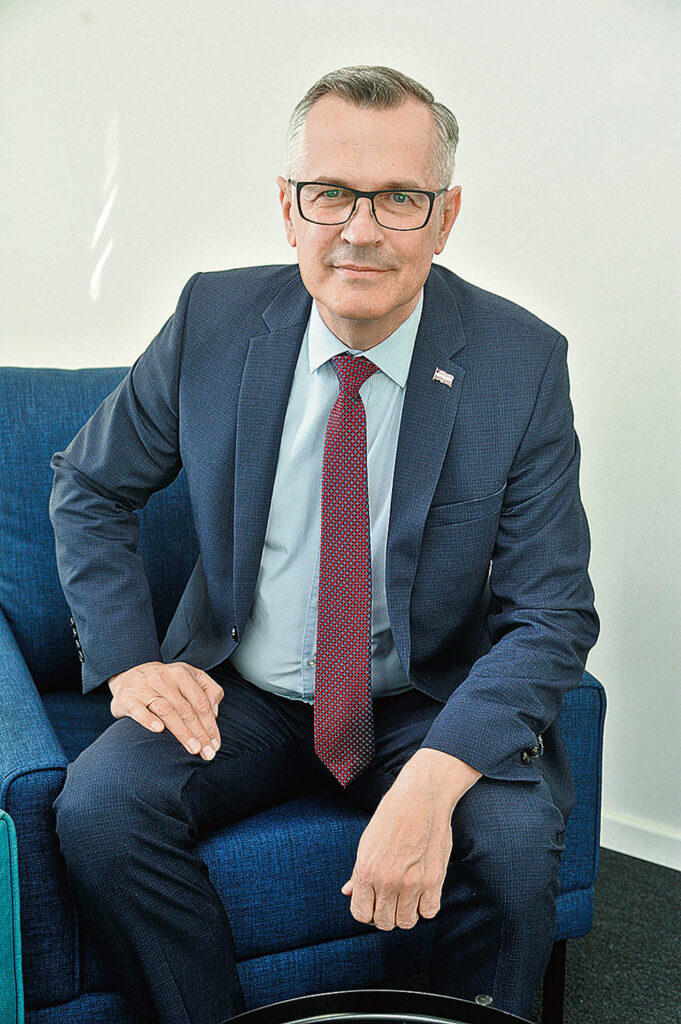
Screenshot from Baltnews
Māris Antonevičs/Latvijas Avīze
“Latvian support for Ukraine’s victory over Russian aggression has declined” – this and similar headlines appeared in late July and early August on several internet portals as LETA reported on a survey conducted by SIA RAIT Custom Research Baltic for the State Chancellery (SC).
The Kremlin propaganda also noticed the news and rushed to share it on its channels.
The portal Baltnews, as if to show that “the people of Latvia have moved from words to deeds”, later also posted a photo from the social networks. It shows graffiti being painted over on the wall of a house in Riga. One of them reads “Stop War” in the colours of the Ukrainian flag. There is no indication that the repainting of the facade was politically motivated – several X (formerly Twitter) users commented on the image – but this did not prevent the Kremlin propaganda media from drawing the conclusions it needed.
Different research agency
The survey, which can also be found on the Cabinet of Ministers’ website, is a June survey on various issues such as trust in state institutions and organisations, sources of information used in daily life, attitudes towards public holidays, pre-election political activities and even content distributed by influencers, but questions about the war in Ukraine also played an important role.
The assumption that the support of Latvians for the victory of Ukraine is decreasing is based on a similar survey conducted in March.
The March survey was also ordered by the State Chancellery, although the research agency was different – Kantar.
In both cases, the survey was conducted on the internet, with 1000 people surveyed in March and 1005 in June. The interviewers themselves have indicated that the statistical measurement error in this case is in the range of +/- 3.1%. So, comparing the two surveys, the statistical error corridor could be even more than six per cent. Thus, according to the researchers themselves, the number of Latvians who want Ukraine to defeat Russia in the war has dropped significantly (from 64% in March to 59% in June, a difference of 5%), which is already quite unconvincing.
More than 70% of Latvians support Ukraine, but…
But there is one other undeniable conclusion that both surveys show – there is a huge difference in the responses of Latvian and Russian speakers. In fact, we see two different societies, which raises the question of whether they can be described as a single society at all.
In a survey conducted by Rait Custom Research Baltic, 71% of Latvian-speaking respondents agreed with the statement “I want Ukraine to win the war” (6% disagreed, 12% find it difficult to answer).
However, among Russian-speaking respondents the picture is quite different – only 26% want Ukraine to win (34% disagree, 41% find it difficult to answer).
Another similar, but slightly differently worded question – “I will support Ukraine until it wins the war”. Latvian-speaking respondents – 71% support, 13% do not support, 16% are unsure. Russian-speaking respondents –19% support, 43% do not support, 38% are unsure.
“By helping Ukraine, we are protecting Latvia from war.” Latvian-speaking respondents – 71% agree, 15% disagree, 13% are unsure. Russian-speaking respondents – 22% agree, 41% disagree, 27% are unsure.
“Western countries must supply Ukraine with all the weapons it needs to fight off Russian forces.” Latvian-speaking respondents – 71% agree, 15% disagree, 15% are unsure. Russian-speaking respondents – 19% agree, 49% disagree, 31% are unsure.
“Western countries must stop all export and import transactions with Russia.” Latvian-speaking respondents – 70% agree, 14% disagree, 16% are unsure. Russian-speaking respondents –18% agree, 47%disagree, 34% are unsure.
Not as large, but also a visible difference in response to “I am tired of the news about the war in Ukraine, I do not want to know anything about it.”
Among Latvians – 35% agree, 53% disagree, 12% find it difficult to answer. Among Russians – 51% agree, 30% disagree, 20% find it difficult to answer.
Among Latvians 63% say they trust Latvian media information about the war in Ukraine, while among Russians – only 23%.
Communication about surveys is not the goal itself
“I agree that there are significant differences between Latvian and Russian speaking respondents. This is not a new phenomenon, we have observed it in previous surveys, including in 2023 and 2022,” says Rihards Bambals, Head of the Strategic Communication Coordination Department of the State Chancellery. Asked why the SC does not highlight this as an important topic, but instead reports about the alleged decline of Latvian support for Ukraine appear in the media, he says that the survey is more for work purposes than for public communication, and in this case the state has not participated in the discussion of the survey results at all. The media does this at its own discretion.
“Surveys are primarily commissioned and conducted to inform members of the Cabinet of Ministers, as well as communication officers in the public administration responsible for these issues,
to plan policies, communication strategies, communication campaigns and other activities. Also to assess whether the current approach is still working or whether changes are needed as the situation in Latvia and the world changes. The survey is an analytical tool that complements the daily monitoring and analysis of the information space on the situation in Latvia, as well as the coverage of Latvia in Russia, Belarus and other Western countries. Conducting a survey is not the goal itself. Nor is the communication about each survey a goal itself or automatic,” says Rihards Bambals. According to him, one can find “positive, neutral and negative things” in the survey data, and the media also do it “according to the interest and editorial settings of the moment”.

Photo by Timurs Subhankulovs
The Head of the Strategic Communication Coordination Department agrees that more discussion is needed on the different attitudes towards Ukraine and Russia, but does not outline what conclusions should be drawn or whether any action should follow: “This is part of our daily work, unfortunately not everything is public and with a media presence.
Ukraine needs support not only at the state level, but also at the societal level until victory is achieved, but it should be understood that this may take several years.
Therefore, it will be essential for us to mobilise awareness and support for Ukraine in our society in the long term, not only among Latvians and Latvian speakers, but also among minorities and those using other languages more frequently in their daily communication and who are perhaps outside the daily audience of Latvian institutions and traditional media.”
Ainars Latkovskis: “There is nothing to hide and pretend.
One of those who previously drew attention to the very different position of Latvians and Russians was President of Latvia Edgars Rinkēvičs, who on the two-year anniversary of the war in February, commenting on the data of a similar survey, said in an interview on LTV: “When we start to look at how it all breaks down, we see absolutely clearly, of course, that to a large extent public opinion also reflects our fragmentation, the influence of Russian propaganda, the lasting influence.”

Photo by Anatolijs Subhankulovs
Ainars Latkovskis (Jaunā Vienotība), head of the Saeima’s National Security Committee, was even more open about this, telling Latvijas Avīze: “There is nothing to hide and pretend, a large part supports Russia. We have to recognise that we have a huge fifth column. That does not mean that all Russians are like this, but this is yet another survey that reminds us of it. Therefore, I do not stop emphasising that internal security will be very important when deciding on next year’s budget. Russia is stuck in Ukraine, so it does not threaten Latvia militarily at the moment, but it can wage a hybrid war against us, including by exploiting this mood among the Russian-speaking people.”
Ainars Latkovskis is convinced that both the authorities and the security services are aware of this. The survey commissioned by the State Chancellery is not the only one, as the State Security Service is also conducting its own research and analysing the situation.
